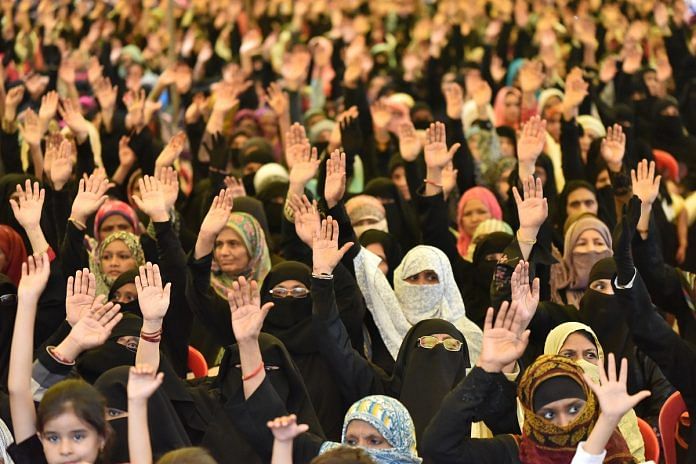The 22nd Law Commission of India has renewed the discussion on crucial topics such as religious freedom and women’s rights by seeking fresh suggestions on the contentious Uniform Civil Code from various religious organisations. It is an inclusive approach that considers the perspectives of various stakeholders by providing them with a 30-day period to present their views.
However, it is important to discuss whether the opinions of religious organisations should take precedence over the concerns of women and women’s groups, given that the personal laws under the UCC predominantly affect women.
Religious organisations have often been obstacles to achieving gender equality in India. The introduction of the UCC can address these disparities and champion women’s rights. The UCC would effectively streamline laws pertaining to marriage, divorce, adoption, guardianship, succession, inheritance, and other issues that greatly impact women in India.
Also read: I am an Indian Muslim watching Pakistan fall apart. I am glad my family…
Not an infringement on freedom
The UCC has remained a controversial issue due to the heavy opposition from a large section of Muslims in India. They argue that the UCC will snatch citizens’ right to follow and practise religion. But that is a misleading claim. The UCC isn’t intended to infringe upon the lifestyles and identities of Indian citizens but aims to safeguard fundamental rights to equality and liberty. Its goal is to strike a balance between individual rights and collective values.
We cannot allow the oppression and marginalisation of women in the name of diversity and culture. Personal laws for most religions are highly discriminative. Muslim personal laws, governed by Sharia, even allow nikah mut’ah or contract marriage and nikah halala or marriage to another man before remarrying a divorced husband.
The 1985 Shah Bano case was an opportunity to bring about reform within the Muslim community, specifically regarding divorce rights for women. Even the Supreme Court observed that Parliament should outline the contours of a common civil code as it is an instrument that facilitates national harmony and equality before law. But it became a tragic turning point where outdated patriarchal interpretations of Muslim personal laws took precedence over gender equality and individual liberty. This case serves as a stark reminder of the setback to gender justice and its profound impact on Indian society and politics. It is essential to learn from this missed opportunity and strive for comprehensive reforms that align personal laws with constitutional principles.
Also read: Kerala couple remarriage shows inequality in Muslim inheritance laws. Tune them to Constitution
‘Reform from within’ already there
Liberals opposing the UCC argue that reform should come from within. While internal factors are important, this argument often overlooks the impact of external sources. Raja Ram Mohan Roy’s fight against Sati in the 19th century was helped by foreign influence — the British government eventually banned it.
Since Independence, the Indian government has actively tried to amend the Hindu code bills to promote gender equality among Hindus. But the fact that it has not shown the same kind of enthusiasm for other communities on similar issues pains me deeply as an Indian Pasmanda Muslim woman.
And it isn’t as if Muslim women have not been vocal regarding their demands. In the name of religious freedom, the State has left us at the mercy of the All India Muslim Personal Law Board (AIMPLB), a deeply patriarchal institution which, to this date, has not even codified Muslim personal laws. Muslim women have filed several public interest litigation (PILs) against practices like nikah mut’ah and nikah halala.
A 2017 report by the Bharatiya Muslim Mahila Andolan (BMMA) across 10 states showed that 91.7 per cent of the surveyed Muslim women opposed polygamy and oral and unilateral talaq. Therefore, the desire to bring about “reform from within” is already present in the Muslim community — what’s left is the State’s introduction of a legal framework that is the UCC.
The drafting of the UCC should be approached within the broader framework of a Universal Bill of Rights for Indian citizens (Ubric). It is important to avoid biased positions under the guise of secularism, as such discrimination only serves to divide communities. The right to exercise religious freedoms should be accessible to individual Indian citizens without granting religious institutions the authority to preside over them.
While it is important to consider diverse perspectives on this matter, the Law Commission’s emphasis should have been on the experiences and struggles faced by women. Women’s organisations, which have tirelessly advocated for gender equality, should be at the forefront of this discussion. Their knowledge and expertise would have, undoubtedly, provided valuable insights into the discriminatory nature of existing personal laws and the urgent need for reform. Hear religious organisations out without giving them disproportionate influence over a matter that primarily affects women.
The time has indeed come to provide equal and fair treatment to all Indian women irrespective of their religious identity. As an Indian Pasmanda Muslim woman, I have a question for the Modi government: For how long would we remain subjected to step-motherly treatment when it comes to our rights?
Amana Begam Ansari is a columnist and TV news panelist. She runs a weekly YouTube show called ‘India This Week by Amana and Khalid’. She tweets @Amana_Ansari. Views are personal.
(Edited by Humra Laeeq)



